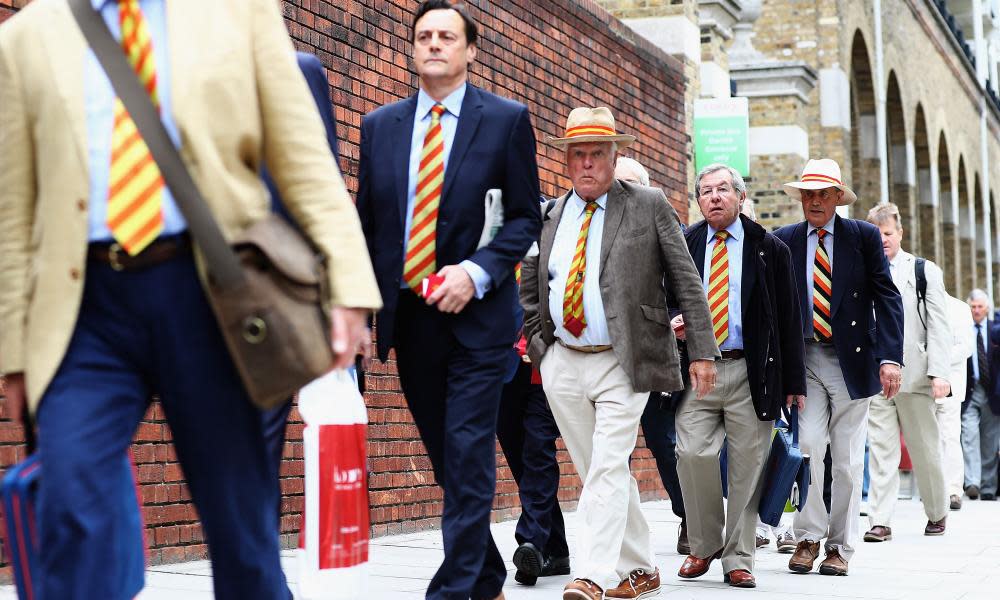Anti-feminist for joining the MCC? Not me – I’m part of an inside job

I’d only heard of the Cresta Run because David Gower once went down it. It was one of those things that patrician daredevils did during the ski season, but it had never occurred to me, until last week, that it was a men-only affair.
It wasn’t always. Between 1887 and 1928, before the words health and safety were introduced to each other, the pioneers of the world-famous St Moritz Tobogganing Club were male and female. Then a female racer was injured and the blow to chivalric pride led to women being banned. The false scientific belief that lying on your chest and hurtling down a sheet of ice caused breast cancer gave the men of the SMTC an excuse to stop women stealing their go on the slide.
This week, the club reopens to female members for the first time in nearly 90 years, although there are still restrictions: they’re only allowed by invitation, under supervision and on limited days. The men-only Garrick Club, too, is revisiting the subject of what to do about the ladies, as its progressive members – don’t laugh – attempt to convince the rest that it’s not that bad sitting in an armchair next to a woman.
The accepted liberal reaction to all of this is to make that rasping euggggh noise in the back of your throat and ask why any woman would want to be a member of one of these stuck-up, backward-looking institutions? We should, the general consensus agrees, let these crusty clubs crumble into obsolescence in a sort of shameful purdah, until the last of the dinosaurs has become extinct and joined that great port cellar in the sky.
Personally, I don’t have that option. On Thursday, I received a letter telling me I had been elected to full membership of the Marylebone Cricket Club. It’s the news I’ve been waiting nearly two decades for, ever since the club finally passed a vote to allow female members (the first one failed). As a young woman who loved cricket, history and tradition, the chance to belong to the game’s most influential and storied club was a no-brainer; I’d been picturing myself in its bacon-and-egg colours years before I was allowed to apply.
Next year, I’ll finally get to watch games from the famous Long Room, one of only a couple of hundred women in an ocean of, let’s be honest, largely elderly men. There are still plenty of friends who can’t understand why I should be proud of that or even desire it at all. One told me that they thought it was demeaning, even anti-feminist, to belong to an institution that had made it clear, for so long, that it didn’t want the likes of me.
Perhaps I shouldn’t feel hurt and insulted by that reaction – but I do. Because I’m not ignorant of the history of attitudes at MCC or any of the other private clubs that have taken centuries to open their doors to those outside their narrow and self-perpetuating demographic. I’m not blind to the fact that prejudice is still openly touted within its elegant Victorian architecture. Last year, I sat taking notes on a game and behind me a man wearing the club tie was boasting so loudly and boringly about his place in Courchevel and the Aubussons at his Scottish hunting lodge that I got up and moved after 20 minutes, unable to concentrate on the game. As I reached the end of my row, he declared to his friends: “I don’t think she watched a single ball, you know.”

So yes, there is still work to do, but why shouldn’t that work be valuable? I appreciate that sitting on a waiting list for 18 years isn’t exactly throwing oneself under a horse. But for those of us who love a bit of heritage, the fight to be a part of it is our way to advance the cause. When other feminists sneer: “Who wants to join these bastions of white male privilege anyway?”, they’re conveniently forgetting that it’s not long ago since these were the battles we cared about.
We should be grateful to the women such as the former England captain Rachael Heyhoe Flint, who fought tirelessly against discriminatory attitudes in the, yes, rarefied atmosphere of cricket’s global headquarters. And we should remember to applaud the policies that took away funding from organisations that weren’t open to all, which forced all-male clubs into the (sometimes grudging) acceptance that they couldn’t carry on as before.
Culture changes, but bias exists in all of us, conscious or unconscious; snobbery is a virus we’re all susceptible to. I’ve always felt far more welcomed, accepted and valued at Lord’s than I do at any of the expensive London clubs with trendy bars and roof terrace pools, where membership primarily connotes a passion for being found in the right place.
Being part of any club is a luxury; it’s important to be aware of that and the responsibility it carries to challenge narrow-mindedness, to encourage inclusivity and diversity. Denouncing the old-fashioned mores of private clubs is fine, but if women don’t then fight to influence the culture from inside them, it’s wasted breath. As for the MCC, I’ve spent enough time at Lord’s to have learned and loved much about the great good that it does, even if there’s some bad or, occasionally, ugly. I know what a privilege it is to be a member and I’m not going to faux-deprecate that for anyone.
• Emma John is a former deputy editor of the Observer Magazine

 Yahoo News
Yahoo News 
